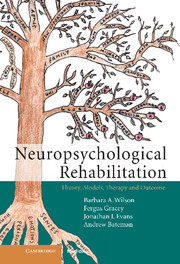Book contents
- Frontmatter
- Contents
- List of contributors
- Foreword by Keith Cicerone
- Preface
- Section 1 Background and theory
- Section 2 Group interventions
- 5 The Understanding Brain Injury (UBI) Group
- 6 The Cognitive Group, Part 1: Attention and Goal Management
- 7 The Cognitive Group, Part 2: Memory
- 8 The Mood Management Group
- 9 The Psychological Support Group
- 10 Working with families in neuropsychological rehabilitation
- 11 Communication Group
- 12 Practically based project groups
- Section 3 Case illustrations
- Section 4 Outcomes
- Index
- Plate section
7 - The Cognitive Group, Part 2: Memory
from Section 2 - Group interventions
Published online by Cambridge University Press: 03 March 2010
- Frontmatter
- Contents
- List of contributors
- Foreword by Keith Cicerone
- Preface
- Section 1 Background and theory
- Section 2 Group interventions
- 5 The Understanding Brain Injury (UBI) Group
- 6 The Cognitive Group, Part 1: Attention and Goal Management
- 7 The Cognitive Group, Part 2: Memory
- 8 The Mood Management Group
- 9 The Psychological Support Group
- 10 Working with families in neuropsychological rehabilitation
- 11 Communication Group
- 12 Practically based project groups
- Section 3 Case illustrations
- Section 4 Outcomes
- Index
- Plate section
Summary
Introduction
Memory problems are amongst the most commonly reported cognitive deficits arising from acquired brain injury. Any condition that affects the physical or functional integrity of the brain is likely to impact on some aspect of a person's ability to remember, as successful remembering involves many different interacting cognitive systems, including attention, memory and executive functions. Furthermore, mood disorders such as anxiety or depression, which impair concentration, also reduce the efficiency of memory.
Remembering difficulties disrupt the ability to participate effectively in activities of daily living, as well as social, leisure and vocational activities. For some, memory problems will be mild and cause only minor inconvenience in everyday life. Others, such as those with the amnesic syndrome that accompanies dysfunction in limbic system structures, may be severely disabled by their memory impairment. People forget to do things (e.g. take medication, turn off the cooker, pay bills, attend appointments, pass on messages), forget what they have been told, forget people's names, forget where they left things (e.g. keys, the car in the car park), find it difficult to remember routes or learn new procedures, have difficulty recollecting personal experiences and so on. Such problems lead to frustration, lowered self-confidence and dependence on others.
What does the evidence base suggest with regard to the rehabilitation of memory? One thing that has consistently been concluded is that memory does not seem to improve as a result of ‘drill and practice’ exercises (Sohlberg and Mateer, 2001; Cicerone et al., 2005).
- Type
- Chapter
- Information
- Neuropsychological RehabilitationTheory, Models, Therapy and Outcome, pp. 98 - 111Publisher: Cambridge University PressPrint publication year: 2009



